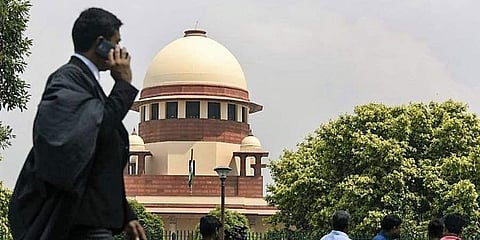

NEW DELHI: Defending the electoral bond scheme, the central government on Friday told the Supreme Court that the methods of receiving money through electoral bonds has been transparent.
Solicitor General of India Tushar Mehta submitted before the bench of Justices BR Gavai and BV Nagarathna that the way in which money is deposited and comes is all accounted for.
“Methodology of receiving electoral bonds is so transparent. It’s impossible to get it through black money and it's the most transparent system,” Mehta said.
Advocate Prashant Bhushan submitted that the case involved three issues of which went to the route of democracy. Against the backdrop of the upcoming elections in Gujarat, Himachal Pradesh, Bhushan while impressing upon the bench to consider the matter at an early date said, “They’ve been issuing electoral bonds before elections.”
Urging the bench to refer the matter to a larger bench, Senior Advocate Kapil Sibal said that the opaque way destroyed the spirit of free and fair elections.
“Unless we notice some conflict, we can't refer it to a larger bench. It's the prerogative of CJI. We’ll hear it on that issue as to whether it should go to a larger bench or not,” Justice BR Gavai remarked while agreeing to firstly consider the issue with regards to reference to a larger bench on December 6, 2022.
The system of electoral bonds was introduced by way of a money bill by amendments in the Finance Act and the Representation of Peoples Act.
ADR in the petitions had argued that such an anonymous route of funding amounted to legitimising bribery as corporates could fund the party in power in a state or Centre as a matter of quid pro quo. Striking on the repercussions of the system on democracy, the petitions had also asserted that the scheme had opened floodgates to unlimited corporate donations to political parties and anonymous financing by Indian as well as foreign companies.
“These donations enjoy 100 per cent tax exemption and even foreign companies can donate through Indian subsidiaries,” the petitioner added. The plea had also contended that the identity of the donors could never be known to the public and referred to reservations raised by the Reserve Bank of India and Election Commission to the Scheme.
When the petitions were last listed on March 26, 2021, the bench led by the then CJI had refused to stay the release of the fresh set of electoral bonds from April 1 for the assembly polls in West Bengal, Kerala, Tamil Nadu, Assam and Puducherry.
The court had said that since the bonds were allowed to be released in 2018, 2019, 2020 without interruption and there were sufficient safeguards, there was justification to not stay them at the moment.
“The apprehension that foreign corporate houses may buy the bonds and attempt to influence the electoral process in the country, is also misconceived. Under Clause 3 of the Scheme, the Bonds may be purchased only by a person, who is a citizen of India or incorporated or established in India,” SC in its order had said.
SC in 2019 by introducing an interim safeguard had asked all political parties to submit details of receipts of the electoral bonds to the Election Commission of India (ECI) in a sealed cover.